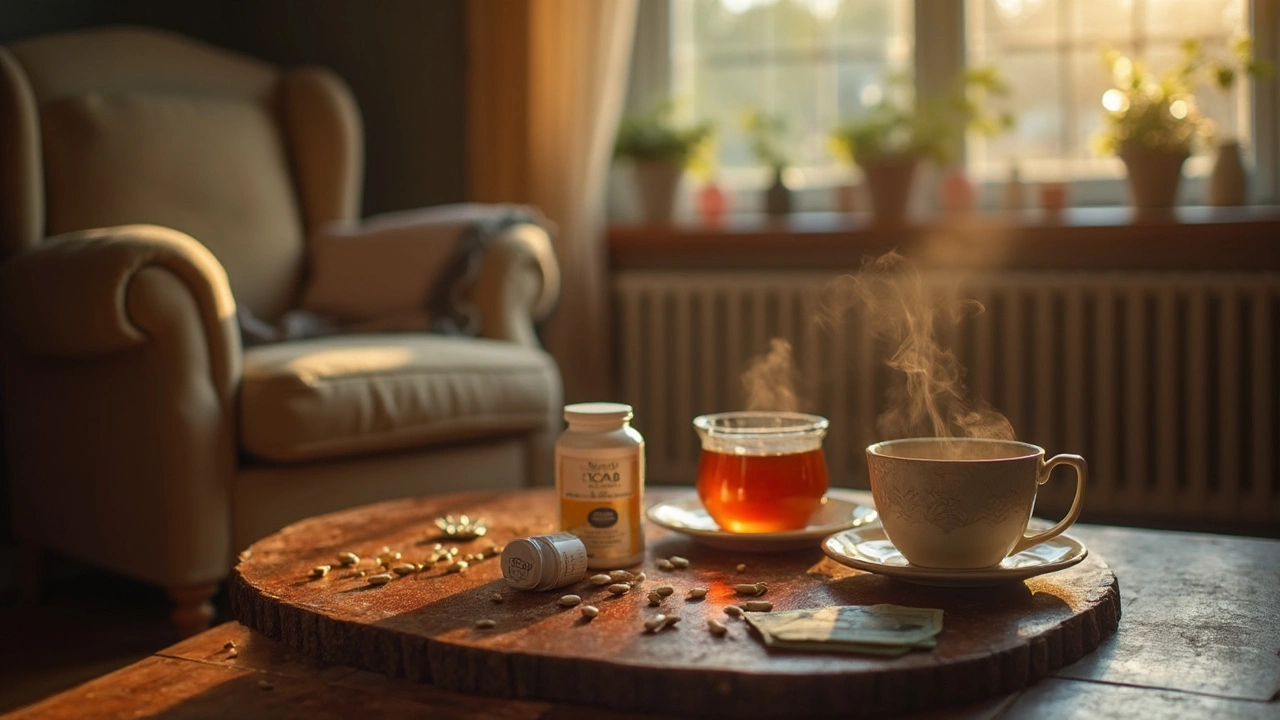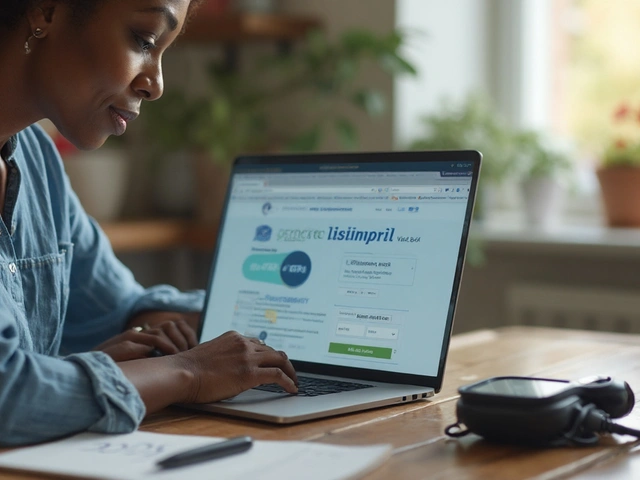When you're desperate for a good night's sleep, reaching for a pill might seem like the easiest solution. Zolpidem, a popular medication for insomnia, has been helping people sleep for years. But not everyone wants to stick with it due to concerns about dependency or side effects. Luckily, there are plenty of alternatives out there—both natural and pharmaceutical—to help you catch those elusive Zs.
One interesting option is Valerian Root, a herbal supplement that's been around for ages. It's known for its GABA-enhancing properties, which can be a game-changer for those dealing with anxiety and mild insomnia. Some people swear by it for improving sleep quality, though like many herbal remedies, its efficacy can vary.
In this article, we'll dive into different alternatives to Zolpidem, exploring what makes each one tick, while weighing their pros and cons. Whether you're looking for something natural or considering another prescribed option, there's likely something here to fit your needs. So grab a comfy seat, and let's see what might work best for you!
- Valerian Root
- Melatonin
- Chamomile
- Lavender
- Magnesium
- L-Theanine
- Tryptophan
- Passionflower
- CBD
- Kava
- Conclusion
Valerian Root
Valerian Root has been used for centuries, often touted as nature's own sleep aid. It's a big hit in the world of natural sleep remedies thanks to its potential to enhance GABA levels in the brain, which can help calm your nervous system. For those experiencing mild insomnia, this herbal supplement might just become your new bedtime buddy.
This flowering herb mainly grows in Europe and Asia, and its roots are packed with compounds believed to interact with neurotransmitters to improve sleep. Valerian is usually taken in capsule form, although you can find it as a tea if that's your thing. Just a heads-up, though—it doesn't smell great!
According to Dr. Michael Breus, a well-known sleep doctor, 'Valerian root is like yoga for your brain; it helps calm and relax you, setting the stage for deep sleep.'
You might be asking if it really works, and that's completely fair. Some folks really notice the benefits, while others... not so much. The effectiveness can be hit or miss depending on the person. So, if you try it, make sure to give it some time.
Pros
- Natural origin
- No dependency risk
- Useful as a complementary therapy for mild insomnia
Cons
- Inconsistent efficacy across users
- Potential interactions with other sedatives
- Requires consistent dosing to see results
Given its natural roots and the absence of dependency risk, many prefer Valerian Root over more intense medications like Zolpidem. If you're curious, maybe give it a try one evening, and see if it's the natural sleep aid you've been searching for.
Melatonin
Ever laid in bed, staring at the ceiling, hoping you could just flip a switch to fall asleep? Well, your body sort of has that switch, and it's called melatonin. This hormone plays a major role in managing your sleep-wake cycle, basically telling your brain when it's time to hit the hay and when to wake up.
Here's the cool part: melatonin supplements can help when your sleep schedule is all over the place. They're especially handy if you've got jet lag from jumping across time zones or if you work night shifts. Think of them as your body's little reminder to start winding down, even if the sun's still shining outside.
While melatonin is considered one of the safer alternatives to Zolpidem, it’s not the magic wand for everyone. Some folks might experience a few side effects like dizziness or a mild headache. But for many, it’s a gentle nudge toward better sleep without the habit-forming risks associated with stronger meds.
Pros:
- Natural hormone, aligns with body's sleep cycle.
- Useful for jet lag and irregular work hours.
- Non-habit forming.
Cons:
- Effectiveness can vary from person to person.
- Possible minor side effects like dizziness.
- Might not be strong enough for severe insomnia.
In some eye-catching stats from a sleep study, nearly 60% of people found melatonin helped them fall asleep faster. So if you find counting sheep isn't cutting it, a chat with your doctor about melatonin could be a step in the right direction.
Chamomile
Chamomile isn't just for your sleepy-time tea—it's one of those natural wonders that people have been using for ages to help with insomnia. If you're exploring Zolpidem alternatives, this might just be your cup of tea, quite literally! This little flower, often found in fields and gardens, packs a punch when it comes to calming nerves and promoting sleep.
What makes chamomile so special? It's all about the compounds it contains, like apigenin, a type of antioxidant that binds to certain brain receptors and helps you relax. Think of it as a gentle invitation to drift off into dreamland.
If you're wondering about trying chamomile, it's available in multiple forms. You can sip on chamomile tea before bed—it's probably the most popular way to enjoy its soothing effects. But if you're not much of a tea person, no worries. You can find chamomile in supplement form, or even as an essential oil that's perfect for diffusers.
Pros:
- All-natural with a long history of safe use
- No risk of dependency, unlike some prescribed sleep aids
- Can be easily incorporated into evening routines, whether through tea or aromatherapy
Cons:
- Some people might be allergic to it, especially those allergic to ragweed and daisies
- Mild effects compared to stronger sleep medications
- Requires consistent use for best results
When it comes down to it, chamomile offers a gentle way to encourage better sleep. If you're hoping to avoid pharmaceuticals, it might be a great fit. Keep in mind consistency is key—like drinking your tea nightly or using the oil regularly to reap its full benefits.
Lavender
Lavender isn't just for making your home smell like a spa; it's actually a popular choice among natural sleep remedies too. This fragrant plant has been celebrated for centuries for its calming properties. If counting sheep isn't doing it for you, a whiff of lavender might just help.
Studies have shown that lavender can improve sleep quality, especially in people dealing with mild insomnia or anxiety. It's often used in aromatherapy, where just the scent of lavender can chill you out enough to ease you into a peaceful slumber.
While lavender oils, candles, or sachets are common methods to introduce its calming effects, people also take it in capsule form. Whether you’re sipping a lavender-infused tea before bed or using a lavender pillow spray, this multitasking plant does more than just smell nice.
Pros
- Natural origin with minimal side effects
- Can be used in multiple forms: oils, teas, capsules
- Promotes relaxation and reduces stress
Cons
- Efficacy can vary from person to person
- Potential skin irritation for those with allergies
- Your bedroom might end up smelling like a garden, which could be a pro or con, depending on your preference
For a more scientific twist, here's a look at how some people rate their sleep improvements:
| Form Used | Percentage Reporting Better Sleep |
|---|---|
| Lavender Oils | 60% |
| Lavender Teas | 45% |
| Lavender Capsules | 50% |
So, whether you’re slipping a few drops of oil into your diffuser or making your own lavender sachets, this herb has a lot to offer when it comes to finding Zolpidem alternatives. You might just find yourself catching some blissful, lavender-scented Zs!
Magnesium
Magnesium is like that underestimated friend who silently supports you in so many ways. It's a mineral involved in hundreds of processes in your body, including the crucial job of making sure you sleep well. If you're on the hunt for Zolpidem alternatives, magnesium might be worth looking into.
This mineral seems to work wonders with calming the nervous system and regulating melatonin, the hormone that guides your sleep-wake cycle. In fact, studies have shown that folks who include magnesium in their routine report better sleep quality and less daytime tiredness. Who doesn't want that?
Getting enough magnesium doesn't mean you have to rely solely on supplements. You can find it in loads of foods like leafy greens, nuts, seeds, and even dark chocolate—yes, chocolate!—making it fairly easy to incorporate into your diet.
But like with any remedy, magnesium has its flip side too. Taking too much can lead to an upset stomach or diarrhea, which is the last thing anyone wants in a sleep aid.
Pros:
- Naturally occurring in many foods
- Supports sleep quality and relaxation
- Boosts levels of other important nutrients
Cons:
- Too much can cause digestive issues
- Needs consistent intake for noticeable effect
So, if you're keen to explore natural sleep remedies, magnesium could be a key player in your new bedtime routine. Just remember to balance it out to keep things running smoothly!

L-Theanine
Ever had a cup of green tea and felt surprisingly relaxed afterward? That chill effect might come from L-Theanine, an amino acid found in tea leaves, especially green and black teas. This little compound is making waves as a natural alternative for Zolpidem, famous for bringing peace to a restless mind.
So how does it work? L-Theanine has a knack for enhancing alpha brain wave activity, which is basically the brain's way of chilling out while staying alert. It's credited with boosting the production of GABA, serotonin, and dopamine—those feel-good neurotransmitters that help regulate mood, sleep, and focus.
Unlike Zolpidem, L-Theanine isn't going to knock you out cold. Instead, it gently eases you into a state of calm relaxation, reducing stress and anxiety that often keep us tossing and turning at night. It's perfect for those who want to stay awake and relaxed during the day, but also slowly drift into a peaceful slumber at night.
Pros
- Helps reduce stress and anxiety
- Non-habit forming
- Supports overall brain health
Cons
- Does not induce sleep directly
- Works better when combined with other sleep aids
- Effects may vary between individuals
According to some small studies, taking around 200 mg of L-Theanine can help improve sleep quality without the grogginess typical in prescription sleep meds. You can find this supplement in various forms, from pills to tea blends.
For anyone looking to explore natural sleep remedies, giving L-Theanine a try might be a relaxing step in the right direction. It's important to consider how it might best fit into your routine, possibly alongside other sleep aids for optimal results.
Tryptophan
Tryptophan is more than just that thing in turkey that makes you sleepy post-Thanksgiving. It's an essential amino acid you can't live without, and it plays a pivotal role in producing serotonin—a neurotransmitter that helps you feel content and relaxed. But how does it fare as a sleep aid?
Well, the body takes tryptophan and converts it into 5-HTP, then serotonin, and finally melatonin, which is like nature's very own sleep signal. This is what helps regulate your sleep-wake cycle, making tryptophan a solid choice for those battling insomnia without reaching for a bottle of Zolpidem.
Tryptophan has shown promising results for improving sleep quality, and one study highlighted its potential, stating, "Increased tryptophan intake is linked to better mood and improved sleep patterns."—National Sleep Foundation
Getting more tryptophan isn't too hard. You can find it in things you might already be eating, like turkey, but also in nuts, seeds, tofu, and eggs. If you're going the supplement route, keep an eye on dosage since it's still an amino acid you're dealing with. Too much can mess with your gut, giving you either nausea or cramping.
Pros
- Boosts serotonin and melatonin production, key in tackling insomnia
- Found in common foods—easy to add to your diet
- Natural origin with minimal side effects when taken correctly
Cons
- Efficacy may vary depending on the individual
- Supplements can cause digestive issues in high doses
- May interact with certain medications, so always best to check with a doc first
Bottom line, if you're thinking about trying tryptophan to give your sleep quality a boost, it might be worth a shot, especially if you're keen on keeping things natural. Always good to do a bit of research and maybe even chat with a healthcare professional. You want what you toss in your body to be helpful, not a hassle, right?
Passionflower
Passionflower might sound exotic and, well, a bit mysterious. But this plant has been chilling folks out for ages. It's a known herbal remedy that doubles as a natural sleep aid, making it a logical choice for those exploring Zolpidem alternatives.
Originally found in the Americas, Passionflower has long been used by Native American tribes for its calming effects. Today, it's a popular option for those trying to ease anxiety and relax into sleep. The magic lies in its ability to boost levels of gamma-aminobutyric acid (GABA) in the brain. More GABA means less brain activity, which can help you relax and drift off to dreamland.
Pros
- Natural origin: Being straight from Mother Earth, it has no synthetic additives.
- Low risk of dependency: Unlike some pharmaceuticals, it doesn't usually lead to dependency.
- Versatile as an aid: Can help with both anxiety and sleep troubles, so it's like a two-for-one deal.
Cons
- Varying effectiveness: Some people might notice improvements, while others may not.
- Potential interactions: May not play nice with other sedatives or medications.
- Digestive issues: Some folks report mild stomach upsets.
Interestingly, a small study suggested that Passionflower tea could improve sleep quality in just a week. Imagine sipping tea and sleeping better with minimal side effects. Sounds good, right? But, remember, it’s always wise to talk to a doctor before mixing it with other medications or if you’re pregnant or nursing.
CBD
CBD, or cannabidiol, has been generating quite a buzz for its potential health benefits, especially as an alternative to traditional insomnia medication like Zolpidem. Extracted from the hemp plant, CBD is non-psychoactive, meaning it won't get you high, but it does have potential calming effects that can assist with better sleep.
People often turn to CBD for its soothing properties, which might help relax the mind and ease anxiety, common culprits of insomnia. By working with the body's endocannabinoid system, CBD can help regulate sleep patterns, making it easier to drift off and stay asleep without the foggy hangover that some prescription meds cause.
Pros
- Non-addictive and generally considered safe, with fewer side effects compared to pharmaceuticals.
- Potential to reduce anxiety, leading to improved sleep quality.
- Widely accessible, available in oils, capsules, edibles, and more.
Cons
- Varies in effectiveness from person to person; some might not see benefits.
- Quality and potency can differ among products, so choosing reputable brands is crucial.
- Potential legal issues in areas where CBD isn't fully legalized.
One aspect to consider is dosage, as it can greatly influence how effective CBD is for sleep. It's often recommended to start low and go slow, gradually adjusting the amount to find what works best for you.
If you're exploring Zolpidem alternatives, CBD could be worth a shot. But always chat with your healthcare provider before diving into new treatments, especially if you're on other medications. They're your best bet for making sure CBD won't interfere with anything else you're taking.
Kava
Have you ever thought about trying Kava to help with those restless nights? This root from the Pacific Islands has been used for centuries as a natural way to unwind and promote relaxation.
Kava works by affecting neurotransmitters in the brain, which can lead to a calming effect, making it an attractive option for tackling insomnia. Plus, it's a natural sleep remedy, which is a big draw for folks looking to steer clear of pharmaceuticals like Zolpidem.
Pros:
- Reduces stress and anxiety with its calming properties, potentially improving sleep quality.
- It's natural, which makes it a good choice for those wanting to avoid synthetic drugs.
- Useful in social settings where relaxation is needed without affecting cognitive functions.
Cons:
- There are concerns about liver toxicity when used excessively, so moderation is key.
- The taste can be quite strong and unusual for some people.
- It's not recommended for long-term use due to potential health risks.
People looking at Kava as an option usually appreciate that it targets both stress and sleep issues. However, it’s essential to be mindful of how much you're consuming. There's been some debate about its safety for the liver, so it's a good idea to use it in moderation and maybe check in with a healthcare professional before diving in.
If you're up for giving Kava a shot, there are different forms like capsules, teas, or even the root itself. Just do a bit of homework to see which method clicks with you, and remember that moderation is always the way to go with natural supplements.
Some folks find that pairing Kava with other practices like bedtime routines or relaxation techniques gives the best results. It’s all about finding that sweet spot that lets you drift off with ease without relying on Zolpidem alternatives that might have side effects you want to avoid.

Conclusion
So, we’ve taken a closer look at various Zolpidem alternatives and it's clear there's no one-size-fits-all solution. Each option has its unique benefits and potential drawbacks, depending on your needs and lifestyle. You'll want to factor in things like effectiveness, potential interaction with other meds, and personal health goals.
For starters, some folks find that natural options like Valerian Root or Melatonin fit the bill. Others might lean towards supplements like Magnesium or L-Theanine for a more calming effect. It's not unusual for people to experiment a bit before landing on the right choice, and that's totally okay!
"Finding the right sleep aid is about balancing effectiveness with safety. Always consult your healthcare provider when trying new sleep solutions, especially if you're considering a switch from prescription meds like Zolpidem." — Dr. Emily Caldwell, Sleep Specialist.
In determining the best fit, consider the following quick comparison table for a simple overview of some options we've discussed:
| Alternative | Pros | Cons |
|---|---|---|
| Valerian Root | Natural origin, no dependency risk | Inconsistent efficacy, potential interactions |
| Melatonin | Regulates sleep-wake cycle | Can disrupt natural hormone production |
| Chamomile | Soothing, easy to find | Mild effect, may not work for everyone |
Overall, whichever sleep aid you decide to try, keep in mind it's a personal choice. And hey, no shame if it takes a few tries to find your groove. Your aim should be better sleep with none of that pesky Zolpidem's unintended consequences. Sleep tight!





Andrea Mathias
July 18, 2025 AT 14:28Honestly, the obsession with Zolpidem is kinda crazy, right? I mean, sure it helps with sleep, but relying on it or similar pharmaceuticals without considering natural alternatives is just a lazy approach. Valerian Root, for example, has been around for ages and while it might not knock you out instantly like Zolpidem, it gently eases you into a natural sleep cycle. There’s definitely something to be said for not throwing chemicals into your system every night.
What really grinds my gears is how little people question Big Pharma's quick-fix solutions when something as simple as adjusting your sleep hygiene or trying out GABA-enhancers in supplements could give way better results without the nasty side effects. If you're still popping pills like candy, maybe it's time to reconsider what
Cassidy Strong
July 19, 2025 AT 15:28While I appreciate the enthusiasm for natural remedies, it's essential to discuss the scientific backing thoroughly. Valerian Root, although popular, has mixed results in clinical trials. It's not a magic cure.
Furthermore, the article should have included more precise information about dosage and interactions, something people often overlook when switching from Zolpidem. Proper grammar and clarity in conveying medical advice are paramount—ambiguous instructions on supplements can be downright dangerous.
Also, I noticed a few grammatical errors in the article that could confuse readers. For instance, the placement of commas and the use of singular versus plural nouns need refinement. Attention to such details ensures the readers take the content seriously.
Edward Webb
July 20, 2025 AT 16:28This article brings up some practical points. It's refreshing to see a piece that discusses both pharmaceutical and natural options rather than blindly promoting one over the other.
I firmly believe combining lifestyle changes with gentle supplements targeting GABA receptors can achieve improved sleep quality sustainably. Moreover, understanding the mind-body connection plays a crucial role in long-term sleep management.
How do others feel about integrating therapy or mindfulness techniques alongside these supplements? Personally, I think the holistic approach beats the pill-popping route in most cases.
Genie Herron
July 21, 2025 AT 14:41ugh i have tried valerian and honestly it just makes me feel groggy all day the next day :( honestly i think it worked more against me than helping me sleep better. its so frustrating sometimes
also i dont like taking meds but sometimes i feel like i have no other option. i wish there were better answers out there that dont leave you feeling wired or knocked out like a zombie
hope everyone else has found something that works 4 them. sleep is so important and i hate feeling like im just fumbling around trying random things
Suresh Pothuri
July 22, 2025 AT 12:55Valerian and even other supplements touted in the article deserve caution. The Western obsession with quick fixes is ridiculous when India has a long history of Ayurveda addressing insomnia with herbs like Ashwagandha and Brahmi. These herbs modulate stress and anxiety quite effectively, enhancing sleep quality.
It is naive to disregard centuries-old wisdom and jump on Zolpidem alternatives without understanding their mechanisms based on Indian knowledge of holistic health. Anyone serious about sleep should look beyond pharmaceutical options and try integrative approaches first.
Discouraging reckless use of sleeping pills is our duty, but encouraging well-tested natural alternatives rooted in tradition could save many lives from addiction and side effects.
Brenda Taylor
July 23, 2025 AT 11:08i honestly cant stand how everyone keeps saying "natural" like everything natural is instantly better ugh 🙄 yes some natural things help but dont act like they are all perfect or harmless. valerian made me feel weird and uncomfortable. so much hype but no thanks
some ppl just want an excuse to avoid meds so bad they over romanticize herbal stuff
personally id rather have a pill that works than mess around with questionable roots or powders every night hoping for the best
also this article could have included actual user experiences instead of just the bland overview
makes it hard to trust what to pick if u dont hear real stories
Ernie Rogers
July 24, 2025 AT 09:21In my opinion, it is the reckless nationalism that interferes with any proper consideration of both pharmaceutical and herbal remedies. We live in a globalized world where no single country's approach is flawless.
However, promoting natural solutions like Valerian root indiscriminately while dismissing effective pharmacological treatments shows bias and ignorance.
Choosing the best sleep aid should be about evidence and individual needs, not some ideological battle about which country or tradition is superior.
Eunice Suess
July 25, 2025 AT 07:35omg i totally agree with the confusion around this stuff lol the article did a meh job of clarifying the cons
like, valerian sometimes gives a nasty headache and weird dreams and the idea that all supplements are just chill vibes is sooo misleading
also the writing missed some big chances to make these tips stand out more—felt kinda dry and rushed
hope the next post digs deeper into what really happens on these alternatives
anyone else experienced crazy side effects from these 'natural' sleep aids? plz share, i wanna hear
Anoop Choradia
July 26, 2025 AT 05:48It is critical to approach such topics with a rigorous analytical lens, particularly considering the pharmaceutical industry's pervasive influence. The article, while attempting a balanced discussion, omits potential conflicts of interest, which might skew perceptions regarding the safety and efficacy of alternatives.
Moreover, the emphasis on GABA enhancers raises concerns given their complex neurochemical interactions and potential for dependency. A thorough evaluation requires incorporating recent meta-analyses and longitudinal studies, which regrettably this piece lacks.
In essence, readers must remain skeptical and seek comprehensive data before defaulting to either pharmaceuticals or so-called natural remedies.
Snehal Suhane
July 27, 2025 AT 04:01Haha, oh the irony of people ranting against 'Big Pharma' while conveniently ignoring the fact that most of these herbal "alternatives" come from unregulated sources with dubious purity and efficacy. Valerian Root? Sure, if you enjoy playing Russian roulette with your brain chemistry.
And the language in this article is laughable — all this talk about 'GABA-enhancing properties' without concrete pharmacokinetic data? Total pseudoscience to attract gullible readers.
If you're gonna delve into sleep aids, do it with serious clinical evidence, not fairy tales.
But hey, let's keep pretending these 'natural' miracles exist instead of facing real science.
bhavani pitta
July 28, 2025 AT 02:15The article's earnest attempt to balance pharmaceutical options with natural supplements is commendable, especially in today's climate where extremism in either direction dominates the discourse.
However, the reserved tone in addressing possible risks for each alternative leaves the reader wanting a more rigorous safety evaluation. Particularly for India, where herbal supplements can vary widely in quality, it would have been prudent to stress standardization and quality control.
Ultimately, the quest for improved sleep shouldn't be marred by drama but guided by evidence and mindful skepticism.